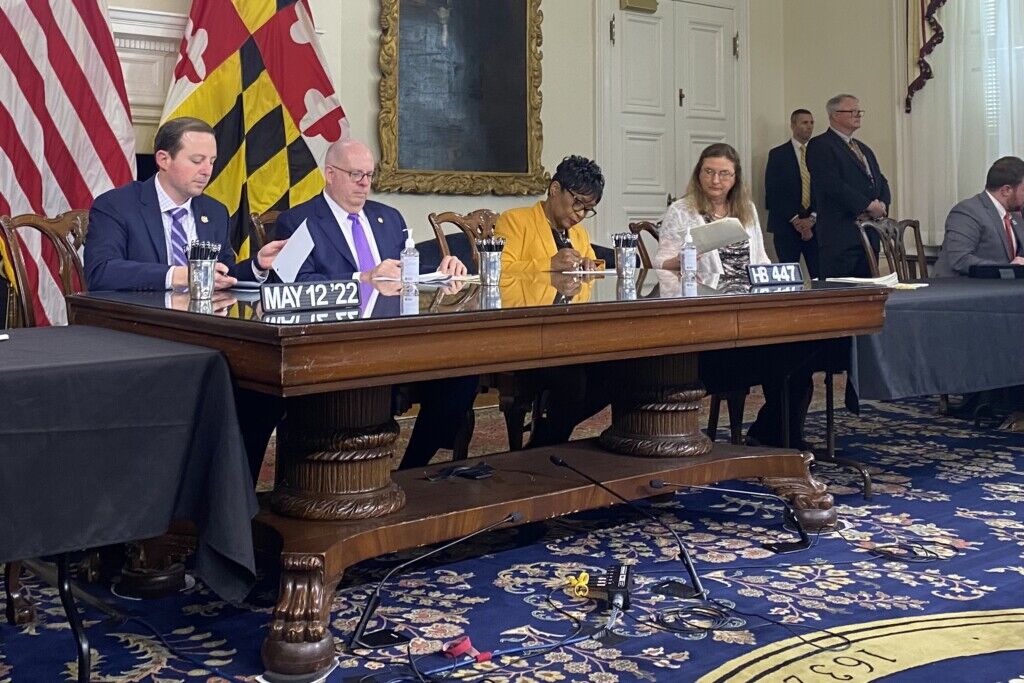
This content was republished with permission from WTOP’s news partners at Maryland Matters. Sign up for Maryland Matters’ free email subscription today.
Gov. Lawrence J. Hogan Jr. (R), House Speaker Adrienne A. Jones (D-Baltimore County) and Senate President Bill Ferguson (D-Baltimore City) signed 105 bills into law on Thursday, including three measures to bolster the state’s cybersecurity network.
“These are bills that really got into the weeds and it really matters that we do this well and in a very bipartisan, thoughtful manner to better protect Maryland’s government and, most importantly, Maryland’s people,” Ferguson said before the signing began.
Among the first bills signed were:
- Senate Bill 754, which will provide funding to permanently establish the Cybersecurity Preparedness Unit in the Maryland Department of Emergency Management;
- Senate Bill 812, which will create a pathway toward centralizing Maryland’s cybersecurity systems management under the Department of Information Technology; and
- House Bill 1205, which will establish a commission through the Department of Information Technology to advise the state chief information security officer on how to modernize legacy technology systems in Maryland’s state agencies.
“The General Assembly is passing bills for a modern society with modern values and upholding our commitment to keep Maryland moving forward,” Jones said.
Hogan said that, in signing these bills, he and the legislature’s presiding officers will “further strengthen Maryland’s standing as the cyber capital of America.”
The legislative package became a pressing need in recent years following cyberattacks against local governments and school systems — and even more so after the Maryland Department of Health endured a cyberattack on Dec. 6, which crippled many of its systems and left local health departments languishing.

Sen. Katie Fry Hester (D-Howard). Photo by Danielle E. Gaines.
It was a hard-fought battle on the part of Sen. Katie Fry Hester (D-Howard), who cosponsored all three alongside Del. Patrick G. Young Jr. (D-Baltimore County), to convince Senate Republicans to vote in favor of the measures, which were viewed as overly broad and quickly written.
After minor tweaks, the package eventually passed out of the Senate on majority or near-majority votes.
Hester and Young, who is leaving the legislature to run for a seat on the Baltimore County Council, co-chaired the Joint Committee on Cybersecurity, Information Technology, and Biotechnology. The committee labored for three years on the bills in consultation with the Department of Information Technology, the Department of Emergency Management, the governor’s office and experts from across the country.
Their enactment is a win for Hester, who is one of the most vulnerable lawmakers up for re-election in the Senate. She will face off against Del. Reid J. Novotny (R-Carroll and Howard), a Maryland Air National Guard colonel and cybersecurity expert, during the 2022 general election.
Among the other 102 bills signed were measures to:
- Require the Maryland Department of Health to provide overdose-reversing drugs to intensive outpatient programs, community organizations, state and local correctional facilities, the Division of Parole and Probation and hospitals at no cost;
- Mandate the Health Department and the Maryland Behavioral Health Administration to have an adequate network of providers to administer substance abuse treatment to minors;
- Create an advisory council within the Opioid Operational Command Center to make recommendations for and track how money from the state’s opioid restitution fund is used;
- Require Maryland’s Medicaid program to cover diagnostic, preventative and restorative dental services for adults who earn up to 133% above the federal poverty level;
- Create the Maryland Loan Assistance Repayment Program, as well as a special fund, to help nurses and nursing assistants repay student loans;
- Increase the amount of tax revenue funneled to local governments for transportation projects;
- Require the State Retirement and Pension System’s Board of Trustees to divest from certain businesses in Russia; and
- Declare that the state of Maryland stands in solidarity with the people of Ukraine.







